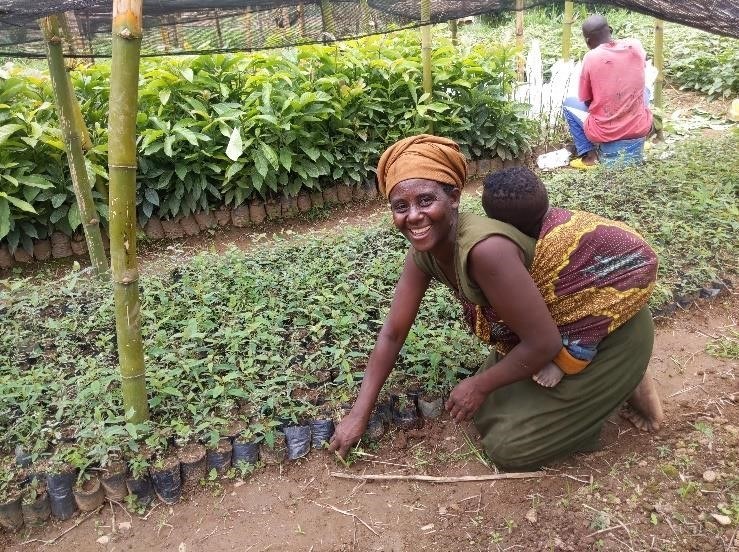Rwanda Action has developed a great working partnership with the RDIS (Rural Development Inter-Diocesan Service) over many years, to protect and restore the natural resources available to communities, by developing tree nurseries. The project is designed to mitigate the effects of deforestation, by producing over 150,000 tree seedlings in a variety of species to provide forestry products, fruit, fodder, critical environmental services, and provision for biodiversity.
The locations of the five tree nurseries were chosen to have the greatest impact on people and the environment. They needed to be accessible to the community who will plant and care for the young trees as well as a having a water source nearby, yet low risk of flooding. The plots of land were rented with a view to continuing after the first growing season.
A manager was recruited for each nursery and received theoretical and practical training in tree nursery management, pest and disease control and avocado grafting techniques. Canopies were built to provide shade and the seeds were planted in well-prepared soil. All the seeds planted had excellent germination rates and avocado seedlings were produced through grafting techniques, with a success rate of 92%.
Of course there were challenges, including poor seed quality of Maesopsis eminii, the umbrella tree, a timber tree which also provides good shade to other species. This species was quickly replaced with Calliandra calothyrsus, which is highly beneficial to farmers as a fodder crop and also for nitrogen fixation, erosion control and improving soil fertility.
We also saw an increase in the cost of materials for the tree nurseries and rental for land, in part driven by the scarcity of suitable plots. Rwanda is densely populated and in the rural areas, virtually every piece of land is under crop production.
The nursery managers maintain the nurseries in collaboration with the Project Coordinator and the Sector Forestry Officer (a local government worker). You can see how well tended the seedlings are in the following photo taken in Bushekeri.
The distribution and planting of trees commenced in October 2024, with 152,673 seedlings transplanted in smallholdings, schools, churches, and public lands. This has been carefully documented so we can monitor outcomes. The recipients described the value of the project to local reforestation efforts to combat soil erosion and landslides and cultivate fruit-bearing trees.
Recipients of tree seedlings |
Number of seedlings received |
Smallholder farmers |
112,904 |
School |
3,012 |
Churches |
15,875 |
Public land, planted during community work (called Umuganda) |
20,882 |
Total |
152,673 |
In addition to the five tree nurseries, the Project Coordinator, tree nursery managers and Sector Agronomists also visited 25 randomly selected past recipients of tree seedlings to assess the survival rate of trees planted in 2023. The average seedling survival rate in this sample was 77%. Given the challenges posed by unpredictable rainy seasons and extended dry seasons, this result is commendable and reflects the resilience of both the seedlings and the sustainable land management practices adopted by farmers.
This brief summary of our joint project in 2024 is based on the annual report of Eric Bagenzi, RDIS/ Director of Environmental Care and Disaster Risk Reduction. Here he is (wearing a white shirt), speaking to the local community on the day seedlings were distributed.
Stories from Tree Nursey Workers
“I am Adelphine, employed as part time worker to help at the Bushenge Tree Nursery, and this project has had a profound socio-economic benefit on my life. I joined the tree nursery project immediately after completing high school. Being part of this initiative has not only allowed me to contribute to environmental conservation but has also provided me with a benefiting source of income. The wages I earn have helped me cover my personal needs and have also enabled me to start a pig farming business as an additional source of income. The skills and knowledge I have gained ranging from nurturing seedlings to managing resources have been invaluable in my personal and professional growth. This project has given me a sense of purpose, instilled a passion for environmental conservation, and taught me the importance of balancing economic sustainability with ecological responsibility. I am grateful for the opportunities this project has provided and excited about the positive changes it continues to bring to my life and the community."

“I am Gilbert, the Ruharambuga Tree Nursery Manager, and I am truly grateful for the opportunity to be part of this project. Working at the Ruharambuga nursery has positively impacted my life in two significant ways. Firstly, I have gained valuable knowledge and practical skills through training, which has enhanced my expertise in nursery management. Secondly, the income I earned has greatly improved my family's well-being. It enabled me to renovate our home, cover school fees for my children, and meet other household necessities. Beyond my personal benefits, I deeply appreciate the positive impact of this project on my community, particularly in Ntendezi Cell, where I live. The availability of fruit trees, agroforestry trees, and forest trees has provided local farmers with essential resources for sustainable agriculture, environmental conservation, and economic empowerment. I am grateful for the role I have played in this initiative and for the lasting benefits it continues to bring to both my family and the wider community."
